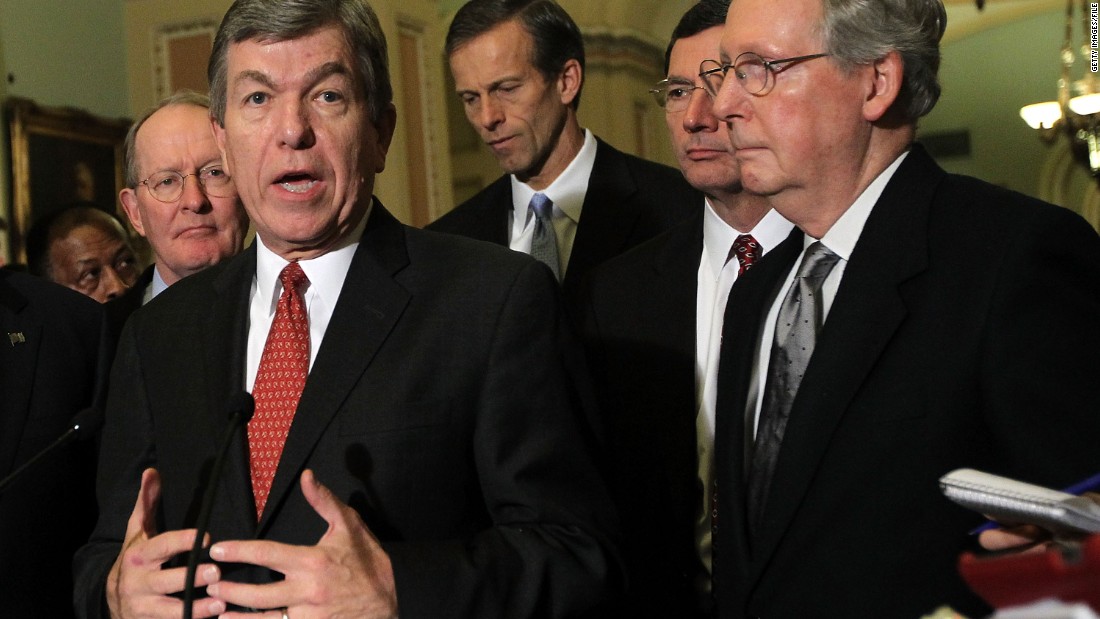
"If there is an agreement, I think we should try to vote before the election, but I am skeptical that there could be an agreement," said Sen. Roy Blunt, a Republican from Missouri and member of party leadership in the chamber.
Pushed on what would happen if a deal were around $1.8 trillion, Blunt said, "You'd have to ask the whip. That is all pretty hypothetical. It depends on what is in it and how you spend it."
Sen. John Thune of South Dakota, the Republican whip in the Senate, said such a deal "would have to be something that would attract a significant amount of Republicans both in the House and the Senate" for Senate Majority Leader Mitch McConnell to bring it to the floor.
"In other words, if they agree to something that has to pass the House with all Democratic votes, then my guess is the leader is going to want to see some evidence that whatever is agreed upon has Republican support," Thune said adding that the "natural instinct" for Senate Republicans would be to oppose anything bigger than the $500 billion Senate GOP proposal that will be voted on for a second time this week.
"I mean I think we're gonna have a hard time finding 13 votes for anything that is very big," Thune said, a reference to how at least 13 Republicans would need to sign on with all 47 members of the Democratic caucus, in order to cross the 60-vote threshhold for advancing legislation in the Senate.
Sen. Ron Johnson, a Republican from Wisconsin, threw up his hands when asked about a deal in the neighborhood of $2 trillion and said simply "way too high."
"I'd have to see what it is, but that's pretty high," Sen. John Hoeven, a Republican from North Dakota told CNN.
Sen. Mike Braun, a Republican from Indiana, told CNN that he would never back a deal that costs as much as $1.8 trillion, but he didn't know if 13 Republicans -- the number that would be needed if every Democrat voted for the package -- might be willing to.
"I think there is a reasonable chance that it could happen where you would get 13. I think that is 50/50," Braun said.
For Republicans, the President's calls to go big on the stimulus have moved relatively few lawmakers as members argue that spending too much money could backfire with conservative voters ahead of the election. For months, the size of the stimulus bill, how much should go to state and local governments and how to handle specific issues like unemployment insurance have consumed private GOP lunches. If Pelosi and Mnuchin were to reach a deal, which remains a big if, Republicans may be forced to openly decide where they stand on another massive stimulus bill just days before the election and if they are going to stand with Trump.
So far, McConnell has not made any commitments about whether he would bring a bill to the floor even if Pelosi and Mnuchin reached an agreement.
For now, some Republicans aren't saying what number would be too high for them to vote for it.
"It's got to be targeted," Sen. Mike Rounds, a Republican from South Dakota told CNN. "I have never identified a specific number, but it has to be targeted."
Sen. Steve Daines, a vulnerable Republican up for reelection in Montana, said that "we are going to have a vote on a good, targeted package," referring to the $500 billion package that Senate Republicans will vote on Wednesday. "We will wait and see if the secretary and the speaker come up with something in the meantime."
Sen. Shelley Moore Capito of West Virginia told reporters that she was not ruling out any package on the basis of price tag.
"I would just have to look at it," she said. "I am not saying no. I am not saying yes."
"come" - Google News
October 20, 2020 at 06:39AM
https://ift.tt/2IIWEBv
Republicans doubt Mnuchin and Pelosi can come up with a stimulus deal they can support - CNN
"come" - Google News
https://ift.tt/2S8UtrZ
Shoes Man Tutorial
Pos News Update
Meme Update
Korean Entertainment News
Japan News Update
Bagikan Berita Ini














0 Response to "Republicans doubt Mnuchin and Pelosi can come up with a stimulus deal they can support - CNN"
Post a Comment